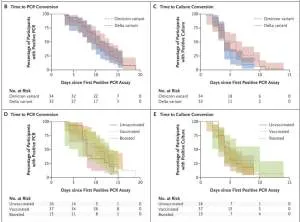(National Pulse) A study published in the New England Journal of Medicine showed that people vaccinated against COVID-19 remained contagious with the virus for a longer period of time than their unvaccinated counterparts.
The disparity in contagiousness was particularly pronounced between the unvaccinated and individuals who did not receive a booster shot.
The findings were published in a letter to the editor signed by dozens of doctors from a variety of hospitals in Boston, Massachusetts in the prestigious New England Journal of Medicine in June. From July 2021 through January 2022, researchers studied 66 participants who contracted COVID-19, including 32 people with the Delta variant and 34 with the Omicron variant.
Researchers compiled a variety of graphs tracking how long people remained contagious with the virus, using both PCR tests and viral cultures as indicators.
When the data was separated into the categories “unvaccinated,” “vaccinated,” and “boosted,” individuals who did not receive a COVID-19 vaccine were contagious for a shorter period of time.
Regarding positive PCR tests, within the first 10 days of contracting the virus 68.75 percent of unvaccinated subjects were no longer contagious. In contrast, just 29.72 percent of vaccinated and 38.46 percent of boosted people were no longer contagious.
Fifteen days into the study, 93.75 percent and 92.31 percent of unvaccinated and boosted people, respectively, were no longer contagious; however, just 78.38 percent of vaccinated people weren’t contagious.







